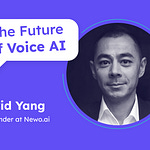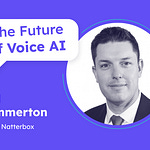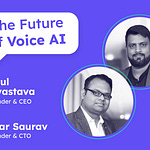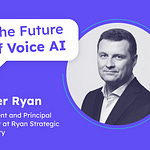In the Future of Voice AI series of interviews, I ask three questions to my guests:
- What problems do you currently see in Enterprise Voice AI?
- How does your company solve these problems?
- What solutions do you envision in the next 5 years?This episode’s guest is Justin Robbins, Founder and Principal Analyst at Metric Sherpa.
Justin Robbins is the founder of Metric Sherpa, an independent analyst firm helping CX leaders, investors, and solution providers cut through the noise and make confident decisions. With a career spanning both the front lines and boardrooms of CX, Justin brings clarity to a fast-changing market. He’s built frontline support teams, advised global brands, and knows firsthand what drives real impact—from the operations floor to executive strategy. Through his research, insights, and content, Justin equips businesses not just with information, but with the direction they need to act.
Metric Sherpa is an analyst firm built on the belief that CX insights should lead to action. The firm was born out of real-world experience in customer operations and a need for clarity in a crowded, fast-moving space. Metric Sherpa helps solution providers, investors, and business leaders find the meaningful signal in the noise, translating market trends into decisions that matter.
Recap Video
Takeaways
Metric Sherpa focuses on turning insights into clear decisions and actions.
Most CX data isn’t useful until it’s made actionable for business decisions.
There’s a major disconnect between what leaders think customers want and what customers actually experience.
AI deployment is exposing how broken and outdated most companies’ knowledge bases really are.
Critical knowledge still lives in employees’ heads, with no scalable way to capture or share it.
Poor knowledge directly causes AI agents to fail and lose companies money.
AI is finally forcing organizations to treat knowledge management as a core function, not an afterthought.
Companies rely on a few internal champions to maintain knowledge, which collapses when they leave.
Automatically generating knowledge from conversations is possible, but requires human oversight to ensure accuracy.
AI can accelerate documentation by drafting knowledge articles that humans refine.
Many leaders claim they’ll reinvest AI savings, but higher-ups often prioritize headcount cuts instead.
Organizational workload won’t decrease with AI; new complexity and tasks will quickly fill the gap.
More efficient support channels could increase usage, driving higher inbound volumes.
Most contact centers are understaffed due to poor visibility into agent productivity and shrinkage.
Frontline agents are starting to take on new roles coaching and guiding AI systems in real time.











